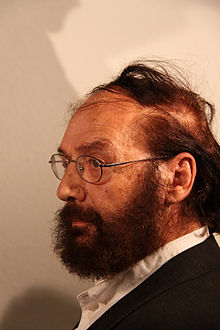Frithjof Bergmann
| Frithjof Bergmann | |
|---|---|
 |
|
| Born | Germany |
| Era | 20th / 21st-century philosophy |
| Region | Western Philosophy |
| School | Continental Philosophy |
|
Main interests
|
Existentialism Cultural philosophy Philosophy of mind Politics Ethics |
|
Influenced
|
|
Frithjof Bergmann (born 24 December 1930) is a Professor Emeritus of philosophy at the University of Michigan, where he has taught courses on existentialism and Continental philosophy.
Professor Bergmann first came to the US as a student, where he has lived and worked ever since. He entered the doctoral program in philosophy at Princeton and studied under Walter Kaufmann, receiving his Ph.D. in 1959 with a dissertation entitled "Harmony and Reason: an Introduction to the Philosophy of Hegel." In addition, Professor Bergmann is a Nietzsche scholar; his publications include "Nietzsche's Critique of Morality" (published in Reading Nietzsche, Oxford University Press, 1988). He spent most of his academic career at the University of Michigan, where he was a professor and visible political activist. He taught also at The University of California at Berkeley, Stanford University and The University of California at Santa Cruz. Among his more notable PhD students at the University of Michigan were Robert C. Solomon and Anthony Weston. He is credited as one of the creators of the teach-in, the first of which was held on the Michigan campus in March 1965.
Professor Bergmann's interests include continental philosophy—especially Hegel, Nietzsche, Sartre, and Existentialism generally—and also social and political philosophy, philosophical anthropology, and philosophy of culture. His article The Experience of Values (reprinted in Revisions: Changing Perspectives in Moral Philosophy by University of Notre Dame Press, 1983) is used in universities throughout the world. His book On Being Free (1977) was issued in a paperback edition in 1978. In this book, Bergmann argues against the standard views of freedom as the lack of external obstacles or as an irrational, unencumbered act that rejects all order. Both of these leave us with nothing substantial for a self at all—and thus, he suggests, constitute virtually a reductio ad absurdum of modern ideals of education, society, and the family. Instead, he argues that the primary prerequisite of freedom is a self possessed of something that wants to be acted out. An act is free, he argues, if the agent identifies with the elements from which it flows. The real problems of education, society, etc. are those of coming to a true understanding of one’s self and of building a society with which a self can identify.
...
Wikipedia
